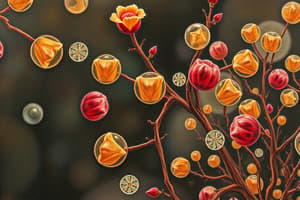Podcast
Questions and Answers
What is the primary function of carbohydrates in cells?
What is the primary function of carbohydrates in cells?
- To play a major role in cell nutrition (correct)
- To store energy in the form of glycogen
- To transmit electrochemical impulses in nerve fibers
- To provide structural functions as part of glycoprotein molecules
How do cells store carbohydrates?
How do cells store carbohydrates?
- In the form of glycogen, an insoluble polymer of glucose (correct)
- As a soluble polymer of glucose
- In the form of insulin
- As a type of lipid molecule
What is the main component of the cell membrane?
What is the main component of the cell membrane?
- A carbohydrate bilayer
- A nucleic acid bilayer
- A protein bilayer
- A lipid bilayer composed of phospholipids, sphingolipids, and cholesterol (correct)
What is the function of the glycocalyx?
What is the function of the glycocalyx?
What is the difference between integral and peripheral proteins in the cell membrane?
What is the difference between integral and peripheral proteins in the cell membrane?
What is the function of the endoplasmic reticulum (ER)?
What is the function of the endoplasmic reticulum (ER)?
What is the difference between rough and smooth ER?
What is the difference between rough and smooth ER?
What is the role of the Golgi apparatus?
What is the role of the Golgi apparatus?
Why are ions important for cellular functions?
Why are ions important for cellular functions?
What is the main function of lysosomes?
What is the main function of lysosomes?
Flashcards are hidden until you start studying
Study Notes
Cell Functions
- Cells provide structure for the body's tissues and organs, ingest nutrients, convert them to energy, perform specialized functions, and contain the body's hereditary code.
Cell Structure
- The nucleus and cytoplasm are the two major parts of a typical cell.
- The nuclear membrane separates the nucleus from the cytoplasm, and the cell membrane (or plasma membrane) separates the cytoplasm from the surrounding fluids.
Protoplasm Composition
- Protoplasm is composed of water, electrolytes, proteins, lipids, and carbohydrates.
- The concentration of water in most cells is 70% to 85%.
- Major ions found in cells include potassium, magnesium, phosphate, sulfate, bicarbonate, sodium, chloride, and calcium, which provide inorganic chemicals for cellular reactions and are necessary for cellular control mechanisms.
Proteins
- There are two types of proteins found in cells: structural proteins and functional proteins.
- Structural proteins form filaments that provide structure, while functional proteins act as enzymes that catalyze chemical reactions.
- Microtubules are intracellular filaments that form the cytoskeleton of cellular organelles and hold the parts of the cytoplasm and nucleoplasm together.
Lipids
- The primary types of lipids found in cells are phospholipids, cholesterol, and triglycerides.
- Phospholipids and cholesterol play a crucial role in forming the cell membrane and intracellular membrane barriers, determining the permeability of the membrane to water-soluble substances and contributing to the fluidity of the membrane.
- Triglycerides act as a readily available energy source in fat cells.
Carbohydrates
- The primary role of carbohydrates in cells is to provide energy and have structural functions as parts of glycoprotein molecules.
- Cells store carbohydrates in the form of glycogen, an insoluble polymer of glucose.
- Glycogen is a readily available energy source that can be quickly mobilized to meet the cell's energy needs.
Cell Membrane Structure
- The basic structure of the cell membrane is a lipid bilayer composed of phospholipids, sphingolipids, and cholesterol, with embedded proteins.
- Integral proteins protrude all the way through the membrane, while peripheral proteins are attached only to one surface of the membrane.
- The glycocalyx is a loose carbohydrate coat on the cell's outer surface that provides a negative charge, attaches cells to each other, acts as receptors for hormones, and participates in immune reactions.
Organelles
- The key organelles found in the cytoplasm are endoplasmic reticulum, Golgi apparatus, mitochondria, lysosomes, and peroxisomes.
- The endoplasmic reticulum (ER) processes molecules made by the cell and transports them to their specific destinations.
- Rough ER has ribosomes attached to its surface and synthesizes proteins, while smooth ER lacks ribosomes and is involved in lipid synthesis.
- The Golgi apparatus processes and packages substances from the ER into lysosomes, secretory vesicles, and other cytoplasmic components.
Water and Ions
- Water acts as a solvent for chemical reactions and suspends particles where reactions take place.
- Ions are necessary for cellular reactions and control mechanisms, such as transmitting electrochemical impulses in nerve and muscle fibers.
Studying That Suits You
Use AI to generate personalized quizzes and flashcards to suit your learning preferences.




